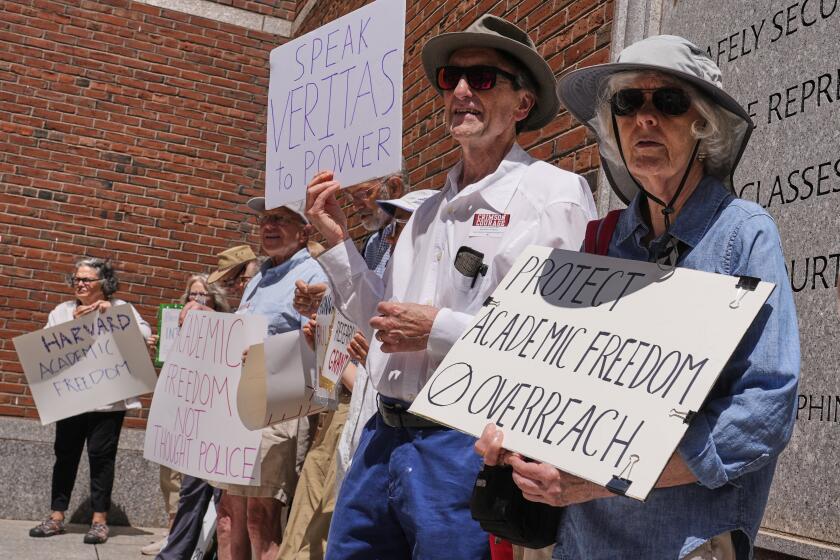Harvard Battles for Billions in Critical Funding Hearing Against Trump

Harvard's Legal Battle with the Trump Administration Over Federal Funding
Harvard University recently appeared in federal court as part of a significant legal battle against the Trump administration, which has been accused of illegally cutting $2.6 billion in federal funding. This case has drawn widespread attention from the higher education sector and beyond, as it represents a major challenge to the administration’s efforts to influence the university’s operations.
The Trump administration has been at odds with Harvard for several months, citing concerns over what it describes as a liberal environment and instances of antisemitism on campus. The administration has imposed various sanctions on the university, including restrictions on its ability to host international students. Harvard has consistently resisted these measures, arguing that they are an overreach of government authority.
At the recent hearing, Harvard’s lawyer, Steven Lehotsky, emphasized that the issue is not about Harvard’s conduct but rather the government’s attempt to control the university’s internal affairs. He warned that if the funding cuts remain in place, it could lead to the loss of critical research, damaged careers, and the closure of laboratories. “It’s not about Harvard’s conduct,” he stated. “It’s about the government’s conduct toward Harvard.”
The case is being presided over by U.S. District Judge Allison Burroughs, who previously ruled in favor of Harvard in a similar lawsuit regarding the administration’s attempts to restrict international student enrollment. During Monday’s hearing, Harvard requested that the judge reverse the funding freezes, which would allow the university to resume its extensive scientific and medical research projects.
The government’s lawyer, Michael Velchik, defended the administration’s actions, claiming that it had the authority to cancel grants due to misalignment with its priorities, particularly an executive order aimed at combating antisemitism. He argued that Harvard allowed antisemitic behavior to flourish following the October 7, 2023, Hamas-led attacks on Israel, including protests on campus and attacks on Jewish students.
Judge Burroughs raised concerns about the government’s lack of evidence to support its claims of antisemitism at Harvard. She questioned how the government could make ad-hoc decisions to cut grants without providing documentation or procedures to assess whether Harvard had adequately addressed antisemitism. “The consequences of that in terms of constitutional law are staggering,” she said.
The lawsuit stems from Harvard’s refusal to comply with demands from a federal antisemitism task force in April. These demands included sweeping changes related to campus protests, academics, and admissions. Harvard President Alan Garber has stated that the university has taken steps to combat antisemitism but rejected the idea that the government should dictate what private universities can teach, whom they can admit, or which areas of study they can pursue.
Several dozen alumni joined students and faculty in a rally against the funding cuts, holding signs that read “Hands Off Harvard” and “Strong USA Needs Strong Harvard.” Anurima Bhargava, who wrote an amicus brief on behalf of over 12,000 Harvard alumni, highlighted the importance of defending the university’s mission and values.
Three Harvard researchers who lost their federal funding spoke about the impact of the cuts on long-term studies related to cancer, cardiovascular diseases, and other health conditions. They expressed concern that the disruptions could force researchers to seek opportunities abroad.
The Trump administration’s pressure campaign has involved multiple sanctions, including freezing $2.2 billion in research grants. Education Secretary Linda McMahon declared Harvard ineligible for new grants, and the administration began canceling contracts with the university. While Harvard has attempted to self-fund some research, it has warned that it cannot absorb the full cost of the federal cuts.
In court filings, Harvard argued that the government failed to explain how terminating funding for research on cancer, veteran support, and national security addresses antisemitism. The administration denies the cuts were retaliatory and asserts that it has broad discretion to cancel contracts for policy reasons.
This case is just one aspect of Harvard’s broader conflict with the Trump administration, which has also sought to prevent the school from hosting foreign students and has threatened to revoke its tax-exempt status. Recently, the administration issued a finding that Harvard tolerated antisemitism, a move that could jeopardize all of its federal funding.
After the hearing, former President Trump criticized Judge Burroughs on his social media platform, calling her a “TOTAL DISASTER.” He also claimed that Harvard was “anti-Semitic, anti-Christian, and anti-America,” despite its substantial endowment.

Posting Komentar untuk "Harvard Battles for Billions in Critical Funding Hearing Against Trump"
Posting Komentar